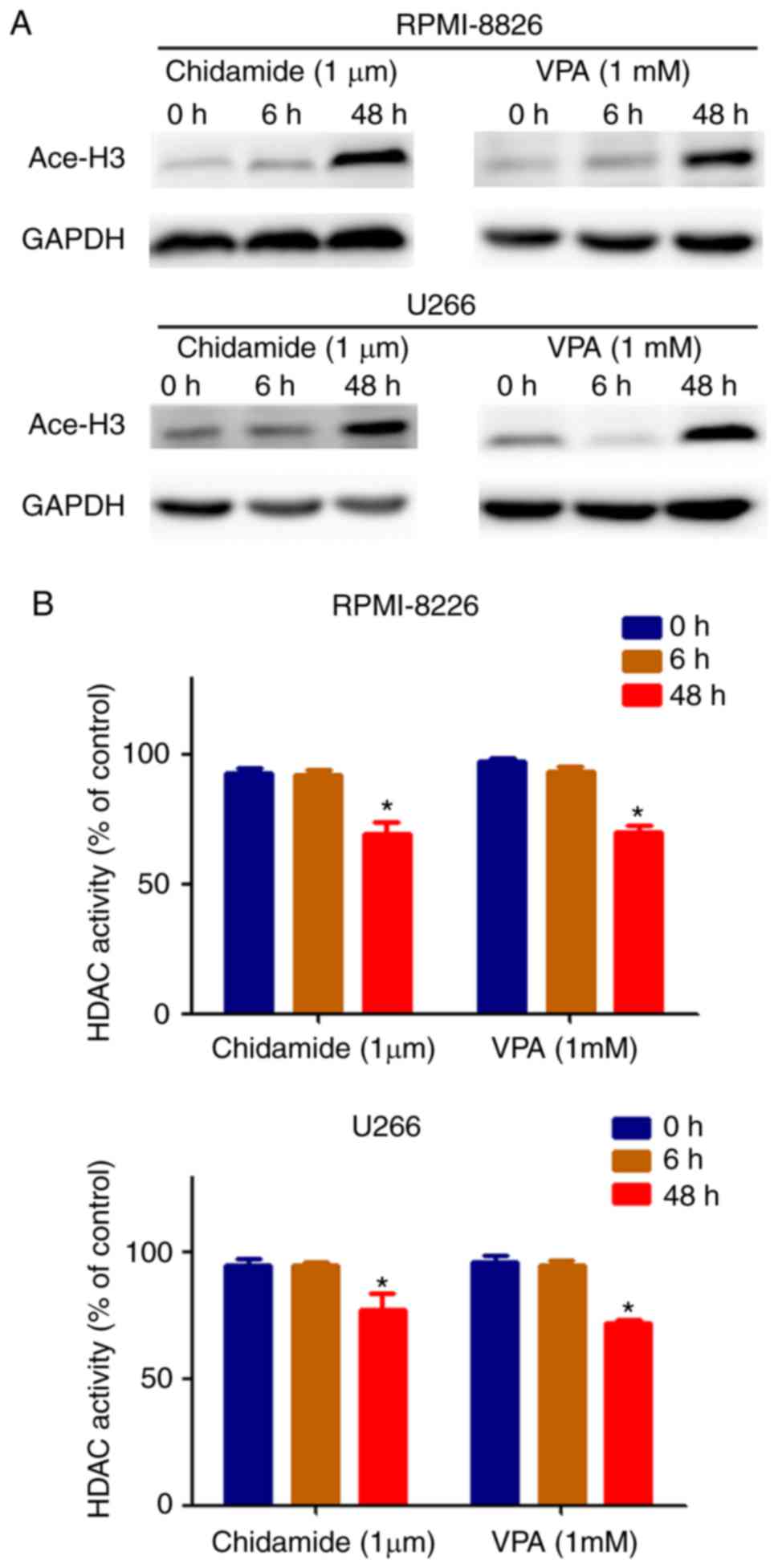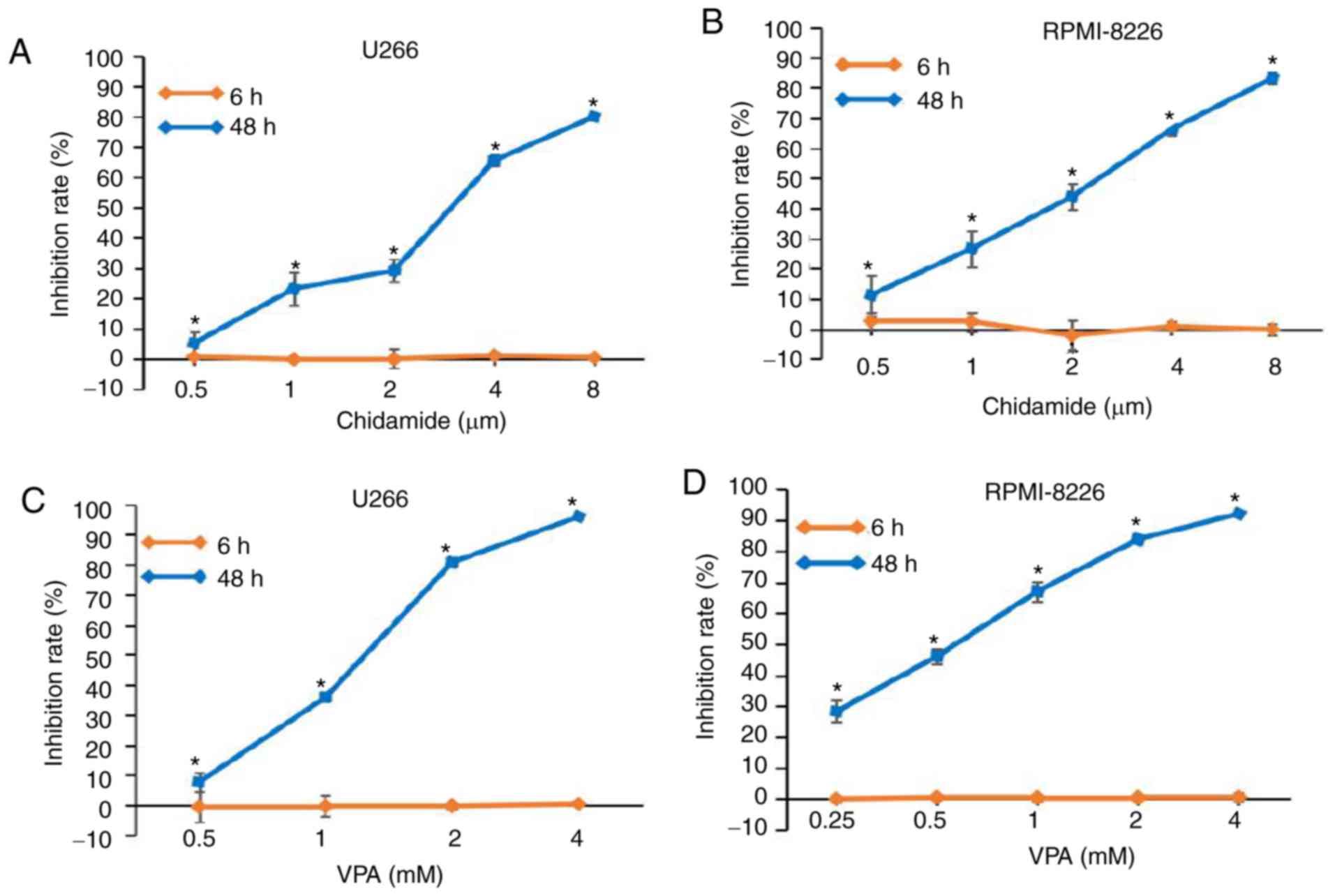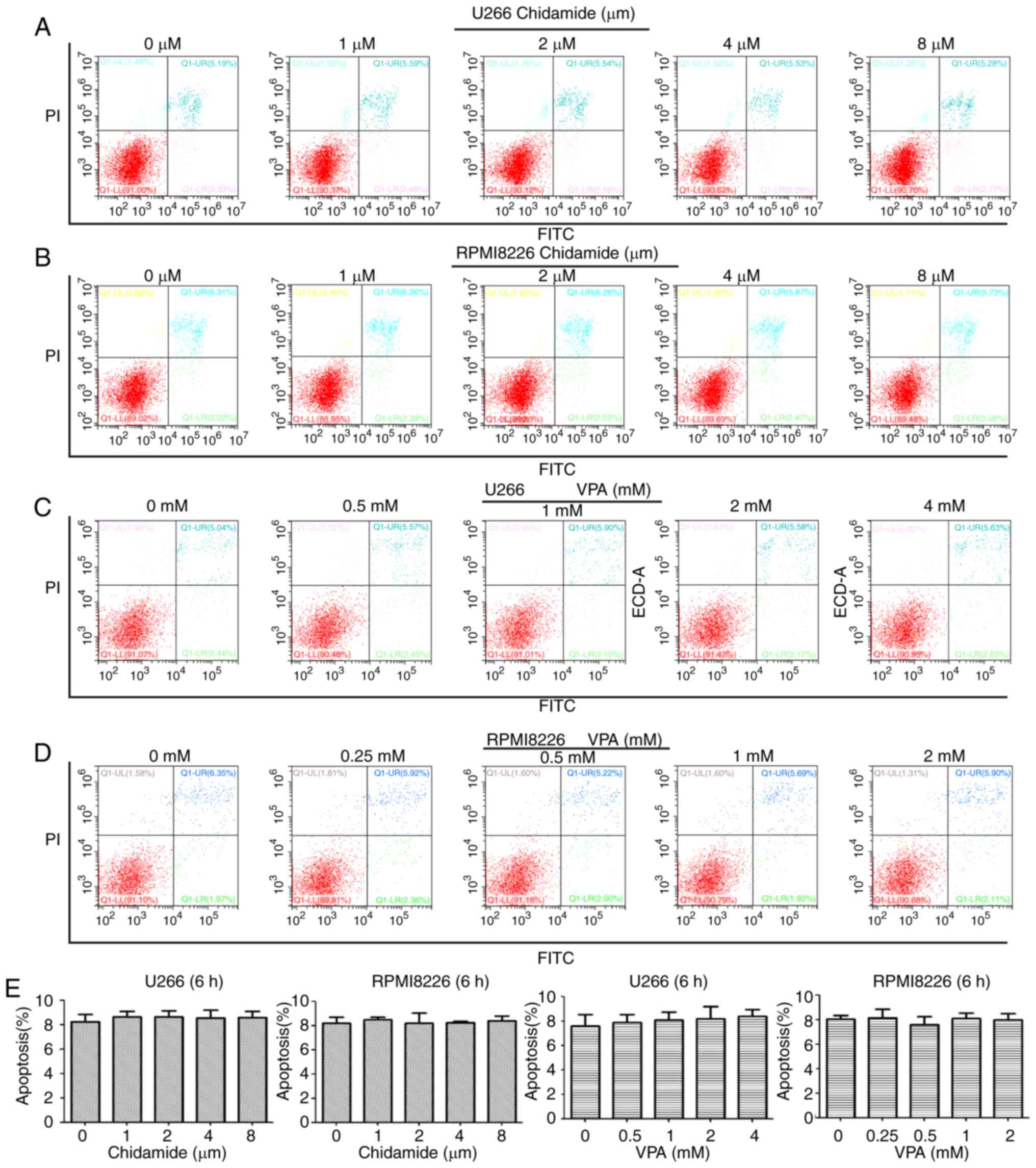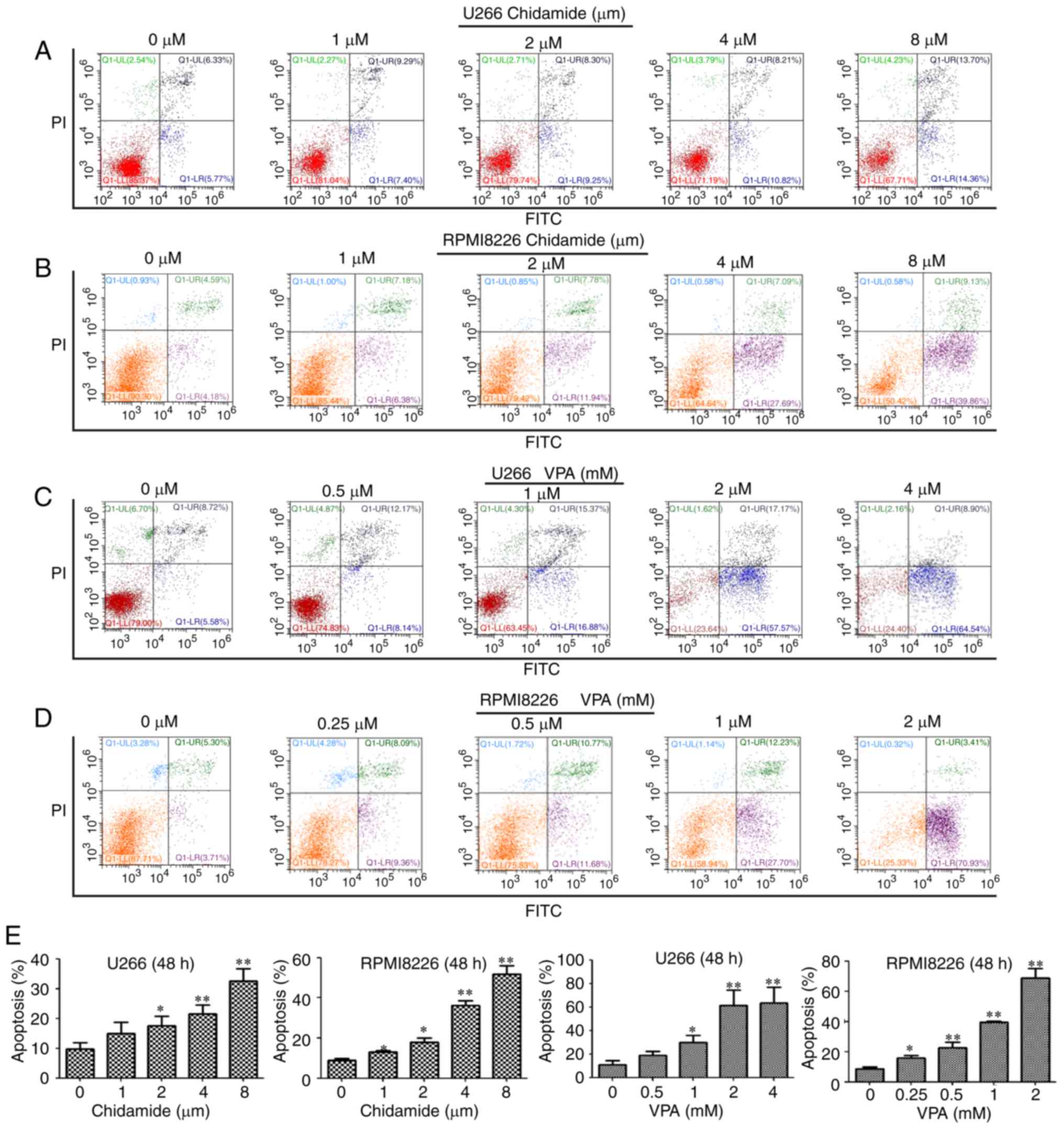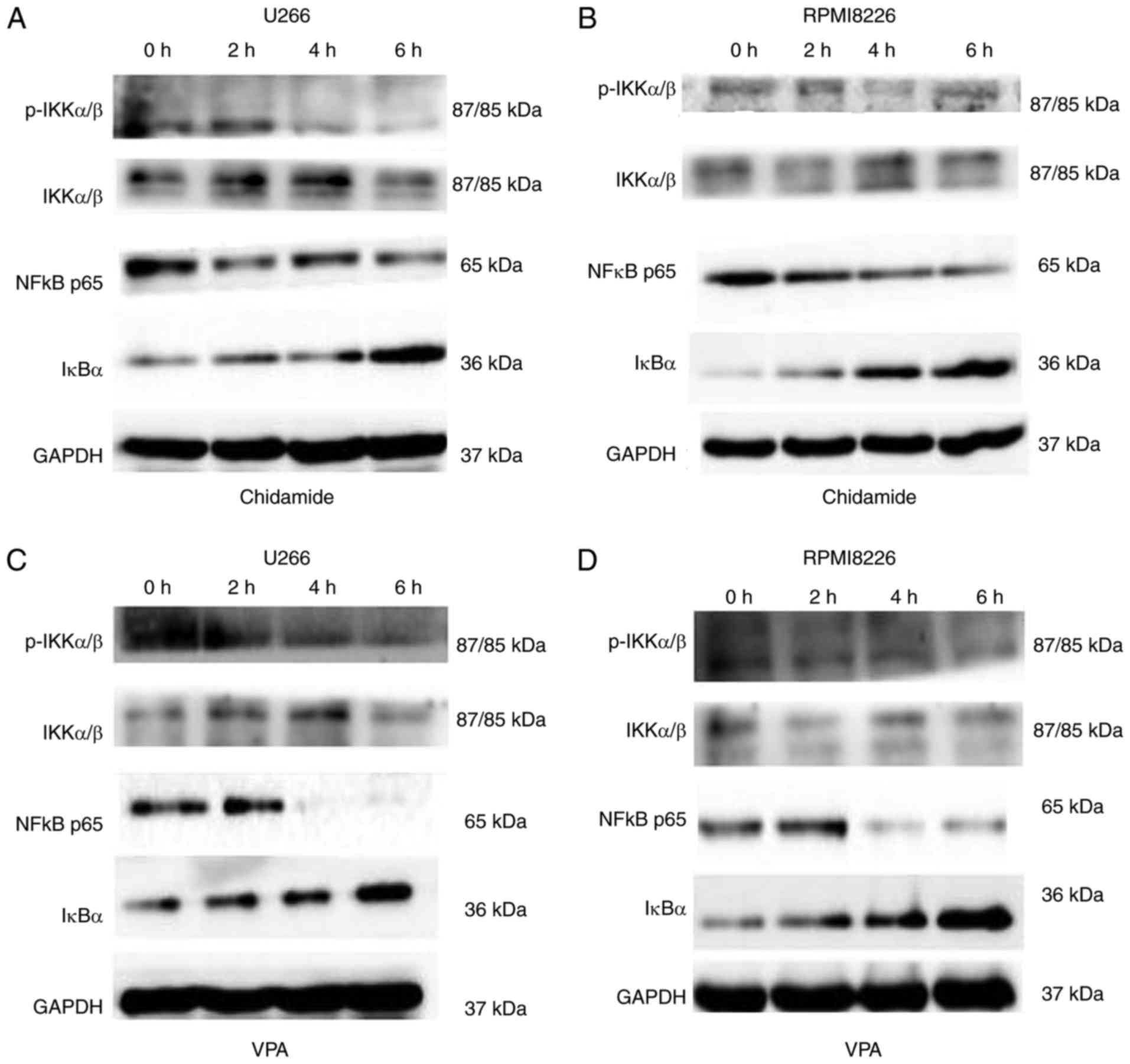|
1
|
Kohgo Y: Recent advances in multiple
myeloma. Int J Clin Oncol. 20:411–412. 2015. View Article : Google Scholar : PubMed/NCBI
|
|
2
|
Palumbo A and Anderson K: Multiple
myeloma. Current Opinion in Oncology. 24(Suppl): S12011. View Article : Google Scholar
|
|
3
|
Siegel R, Ma J, Zou Z and Jemal A: Cancer
statistics, 2014. CA Cancer J Clin. 64:9–29. 2014. View Article : Google Scholar : PubMed/NCBI
|
|
4
|
Moreau P, Attal M and Facon T: Frontline
therapy of multiple myeloma. Blood. 125:3076–3084. 2015. View Article : Google Scholar : PubMed/NCBI
|
|
5
|
Laubach JP, San-Miguel JF, Hungria V, Hou
J, Moreau P, Lonial S and Lee JH: An advance in myeloma therapy?
Expert Rev Hematol. 10:229–237. 2017. View Article : Google Scholar : PubMed/NCBI
|
|
6
|
Greig SL: Panobinostat: A review in
relapsed or refractory multiple myeloma. Targeted Oncol.
11:107–114. 2016. View Article : Google Scholar
|
|
7
|
Ceccacci E and Minucci S: Inhibition of
histone deacetylases in cancer therapy: Lessons from leukaemia. Br
J Cancer. 114:605–611. 2016. View Article : Google Scholar : PubMed/NCBI
|
|
8
|
Eckschlager T, Plch J, Stiborova M and
Hrabeta J: Histone deacetylase inhibitors as anticancer drugs. Int
J Mol Sci. 18:14142017. View Article : Google Scholar :
|
|
9
|
Xu L, Tang HL, Gong X, Xin XL, Dong Y, Gao
GX, Shu MM and Chen XQ: Inducing effect of chidamide on apoptosis
of multiple myeloma cells and its relerance to DNA damage response.
Zhongguo Shi Yan Xue Ye Xue Za Zhi. 23:450–454. 2015.In Chinese.
PubMed/NCBI
|
|
10
|
Wang DY, Cui YS, Liu YZ, Liu LN, Song YP
and Fang BJ: Successful treatment of one case with relapsed
refractory multiple myeloma by chidamide in combination with
bortezomib and dexamethasone. Zhonghua Xue Ye Xue Za Zhi.
37:4632016.In Chinese.
|
|
11
|
Göttlicher M, Minucci S, Zhu P, Krämer OH,
Schimpf A, Giavara S, Sleeman JP, Lo Coco F, Nervi C, Pelicci PG
and Heinzel T: Valproic acid defines a novel class of HDAC
inhibitors inducing differentiation of transformed cells. Embo J.
20:6969–6978. 2001. View Article : Google Scholar : PubMed/NCBI
|
|
12
|
Kaiser M, Zavrski I, Sterz J, Jakob C,
Fleissner C, Kloetzel PM, Sezer O and Heider U: The effects of the
histone deacetylase inhibitor valproic acid on cell cycle, growth
suppression and apoptosis in multiple myeloma. Haematologica.
91:248–251. 2006.PubMed/NCBI
|
|
13
|
Wang XN and Zhang M: Apoptosis-inducing
effect of valproic acid combined with arsenic trioxide on RPMI 8226
cells and its mechanism. Zhongguo Shi Yan Xue Ye Xue Za ZhI.
22:1016–1021. 2014.In Chinese. PubMed/NCBI
|
|
14
|
Dong XF, Song Q, Li LZ, Zhao CL and Wang
LQ: Histone deacetylase inhibitor valproic acid inhibits
proliferation and induces apoptosis in KM3 cells via downregulating
VEGF receptor. Neuro Endocrinol Lett. 28:775–780. 2007.PubMed/NCBI
|
|
15
|
Kitazoe KI, Abe M, Hiasa M, Oda A, Amou H,
Harada T, Nakano A, Takeuchi K, Hashimoto T, Ozaki S and Matsumoto
T: Valproic acid exerts anti-tumor as well as anti-angiogenic
effects on myeloma. Int J Hematol. 89:45–57. 2009. View Article : Google Scholar
|
|
16
|
Qiao L, Yang Y, Zhao RJ, Wang LH, Zhao L,
Yan LN, Zhang ZH and Hao CL: Effects of VPA on the expression of
notch signaling pathway in multiple myeloma RPMI 8226 cell line.
Zhongguo Shi Yan Xue Ye XuezazhI. 24:1449–1453. 2016.In
Chinese.
|
|
17
|
Jin YL, Dong BX, Xu L, Tang HL, Gao GX, Gu
HT, Shu MM and Chen XQ: Valproic acid represses autophagy and
enhances the anti-myeloma activity of DNA-damaging drugs. Zhongguo
Shi Yan Xue Ye Xuezazhi. 23:718–721. 2015.In Chinese.
|
|
18
|
Zhang YY, Zhang ZH, Zhao RJ, Li H, Wang
TR, Yan LN, Gu CH, Zhao L and Hao CL: Valproic acid activates
autophagy in multiple myeloma cell lines RPMI8226 and U266.
Zhonghuaxue Ye XuezazhI. 37:478–483. 2016.In Chinese.
|
|
19
|
Fabre C, Grosjean J, Tailler M, Boehrer S,
Adès L, Perfettini JL, de Botton S and Fenaux P: NFkappaB
inhibition in malignant myeloblasts. Cell Cycle. 7:2139–2145. 2008.
View Article : Google Scholar : PubMed/NCBI
|
|
20
|
Dutta J, Fan Y, Gupta N, Fan G and Gélinas
C: Current insights into the regulation of programmed cell death by
NF-κB. Oncogene. 25:6800–6816. 2006. View Article : Google Scholar : PubMed/NCBI
|
|
21
|
Oeckinghaus A and Ghosh S: The NF-κB
family of transcription factors and its regulation. Cold Spring
Harb Perspect Biol. a0000342009.
|
|
22
|
Chen ZJ: Ubiquitination in signaling to
and activation of IKK. Immunol Rev. 246:95–106. 2012. View Article : Google Scholar : PubMed/NCBI
|
|
23
|
Annunziata CM, Davis RE, Demchenko Y,
Bellamy W, Gabrea A, Zhan F, Lenz G, Hanamura I, Wright G, Xiao W,
et al: Frequent engagement of the classical and alternative
NF-kappaB pathways by diverse genetic abnormalities in multiple
myeloma. Cancer Cell. 12:115–130. 2007. View Article : Google Scholar : PubMed/NCBI
|
|
24
|
Hayden MS and Ghosh S: NF-κB, the first
quarter-century: Remarkable progress and outstanding questions.
Genes Dev. 26:203–234. 2012. View Article : Google Scholar : PubMed/NCBI
|
|
25
|
Kannaiyan R, Hay HS, Rajendran P, Li F,
Shanmugam MK, Vali S, Abbasi T, Kapoor S, Sharma A, Kumar AP, et
al: Celastrol inhibits proliferation and induces chemosensitization
through down-regulation of NF-κB and STAT3 regulated gene products
in multiple myeloma cells. Br J Pharmacol. 164:1506–1521. 2011.
View Article : Google Scholar : PubMed/NCBI
|
|
26
|
Qu X, Du J, Zhang C, Fu W, Xi H, Zou J and
Hou J: Arsenic trioxide exerts antimyeloma effects by inhibiting
activity in the cytoplasmic substrates of histone deacetylase 6.
PLoS One. 7:e322152012. View Article : Google Scholar : PubMed/NCBI
|
|
27
|
Li Z, Yang Z, Peng X, Li Y, Liu Q and Chen
J: Nuclear factor-κB is involved in the protocadherin-10-mediated
pro-apoptotic effect in multiple myeloma. Mol Med Rep. 10:832–838.
2014. View Article : Google Scholar : PubMed/NCBI
|
|
28
|
Alkalay I, Yaron A, Hatzubai A, Orian A,
Ciechanover A and Ben-Neriah Y: Stimulation-dependent IκBα
phosphorylation marks the NF-κB inhibitor for degradation via the
ubiquitin-proteasome pathway. Proc Natl Acad Sci USA.
92:10599–10603. 1995. View Article : Google Scholar
|
|
29
|
Bharti AC, Shishodia S, Reuben JM, Weber
D, Alexanian R, Raj-Vadhan S, Estrov Z, Talpaz M and Aggarwal BB:
Nuclear factor-kappaB and STAT3 are constitutively active in
CD138+ cells derived from multiple myeloma patients, and
suppression of these transcription factors leads to apoptosis.
Blood. 103:3175–3184. 2004. View Article : Google Scholar : PubMed/NCBI
|
|
30
|
Shi Y, Dong M, Hong X, Zhang W, Feng J,
Zhu J, Yu L, Ke X, Huang H, Shen Z, et al: Results from a
multicenter, open-label, pivotal phase II study of chidamide in
relapsed or refractory peripheral T-cell lymphoma. Ann Oncol.
26:1766–1771. 2015. View Article : Google Scholar : PubMed/NCBI
|
|
31
|
Liu L, Chen B, Qin S, Li S, He X, Qiu S,
Zhao W and Zhao H: A novel histone deacetylase inhibitor Chidamide
induces apoptosis of human colon cancer cells. Biochem Biophys Res
Commun. 392:190–195. 2010. View Article : Google Scholar : PubMed/NCBI
|
|
32
|
Ning ZQ, Li ZB, Newman MJ, Shan S, Wang
XH, Pan DS, Zhang J, Dong M, Du X and Lu XP: Chidamide
(CS055/HBI-8000): A new histone deacetylase inhibitor of the
benzamide class with antitumor activity and the ability to enhance
immune cell- mediated tumor cell cytotoxicity. Cancer Chemother
Pharmacol. 69:901–909. 2012. View Article : Google Scholar
|
|
33
|
Walkinshaw DR and Yang XJ: Histone
deacetylase inhibitors as novel anticancer therapeutics. Curr
Oncol. 15:237–243. 2008.PubMed/NCBI
|
|
34
|
Liu Z, Ding K, Li L, Liu H, Wang Y, Liu C
and Fu R: A novel histone deacetylase inhibitor Chidamide induces
G0/G1 arrest and apoptosis in myelodysplastic syndromes. Biomed
Pharmacother. 83:1032–1037. 2016. View Article : Google Scholar : PubMed/NCBI
|
|
35
|
Saha SK, Yin Y, Kim K, Yang GM, Dayem AA,
Choi HY and Cho SG: Valproic acid induces endocytosis-mediated
doxorubicin internalization and shows synergistic cytotoxic effects
in hepato-cellular carcinoma cells. Int J Mol Sci. 18:E10482017.
View Article : Google Scholar
|
|
36
|
Yang S, Nan P, Li C, Lin F, Li H, Wang T,
Zhou C, Zhang X, Meng X, Qian H, et al: Inhibitory effect of
chidamide on the growth of human adenoid cystic carcinoma cells.
Biomed Pharmacother. 99:608–614. 2018. View Article : Google Scholar : PubMed/NCBI
|
|
37
|
Chen X, Wang H, Zhou M, Li X, Fang Z, Gao
H, Li Y and Hu W: Valproic acid attenuates traumatic brain
injury-induced inflammation in vivo: Involvement of autophagy and
the Nrf2/ARE signaling pathway. Front Mol Neurosci. 11:1–13. 2018.
View Article : Google Scholar
|
|
38
|
Qiao Mu H, Wang Z, Kuai Y, Li Q, Wang C,
Jiang Y, Wang X, Li X, He WM, et al: Chidamide inhibits aerobic
metabolism to induce pancreatic cancer cell growth arrest by
promoting Mcl-1 degradation. PLoS One. 11:e01668962016. View Article : Google Scholar : PubMed/NCBI
|
|
39
|
Li Y, Wang Y, Zhou Y, Li J, Chen K, Zhang
L, Deng M, Deng S, Li P and Xu B: Cooperative effect of chidamide
and chemotherapeutic drugs induce apoptosis by DNA damage
accumulation and repair defects in acute myeloid leukemia stem and
progenitor cells. Clin Epigenetics. 9:832017. View Article : Google Scholar : PubMed/NCBI
|
|
40
|
GilardiniMontani MS, Granato M, Santoni C,
Del Porto P, Merendino N, D’Orazi G, Faggioni A and Cirone M:
Histone deacetylase inhibitors VPA and TSA induce apoptosis and
autophagy in pancreatic cancer cells. Cell Oncol (Dordr). 40:1–14.
2017.
|















